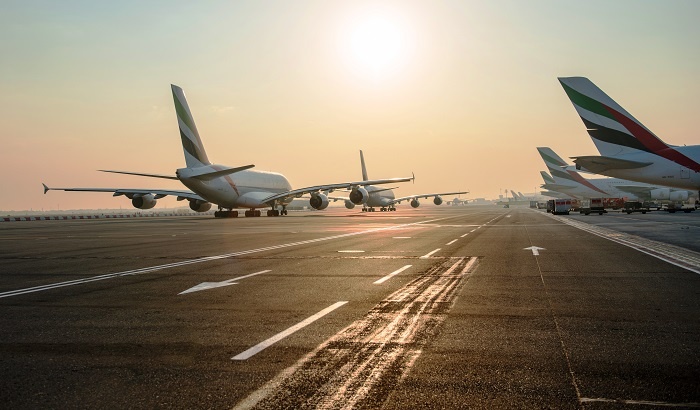
Emirates overcomes rising oil price to see profits rise in first half of financial year
The Emirates Group has announced steady revenue growth and a rebound on profitability compared to the same period last year in half-year results for 2017-18.
The figures come in spite of the continuing downward pressure on margins, a rise in oil prices, and other challenges for the airline and travel industry.
The Emirates Group revenue was AED49.4 billion (US$ 13.5 billion) for the first six months of its 2017-18 financial year, up six per cent from AED 46.5 billion (US$ 12.7 billion) during the same period last year.
Profitability rebounded after a low during the same period last year, with the group reporting a 2017-18 half-year net profit of AED2.3 billion (US$ 631 million), up 77 per cent.
This result was driven by capacity optimisation and efficiency initiatives across the company, steady business growth, and a more favourable foreign exchange situation compared to the same period last year.
The group’s cash position on September 30th this year was at AED 18.9 billion (US$ 5.2 billion), compared to AED19.1 billion (US$ 5.2 billion) as at March.
Ahmed bin Saeed Al Maktoum, chairman, Emirates Airline, said: “A lot of the credit for our 2017-18 half-year results goes to our talented workforce who have worked hard to improve our business performance, and address our challenges without compromising on quality and service.
“Our margins continue to face strong downward pressure from increased competition, oil prices have risen, and we still face weak economic and uncertain political realities in many parts of the world.
“Yet, the group has improved revenue and profit performance.
“This speaks to the resilience of our business model, and the agility of our people.
ADVERTISEMENT
“The easing of the strong US dollar against other major currencies helped our profitability.
“We are also seeing the benefit from various initiatives across the company to enhance our capability and efficiency with new technologies and new ways of working.
“Moving forward, we will continue to keep a careful eye on costs while investing to grow our business and provide our customers with world-class products and services.”
In the past six months, the group’s employee base reduced by three per cent compared to March 2017, from an overall staff count of 105,746 to 102,669.
This was largely a result of natural attrition together with a slower pace of recruitment, as various parts of the business adopted new technologies, streamlined business processes and re-allocated resources.
Emirates continued to invest in the most advanced wide-body aircraft to improve overall efficiency and provide better customer experience.
During the first six months of 2017-18, Emirates received ten wide-body aircraft – four Airbus A380s, and six6 Boeing 777s, with nine more new aircraft scheduled to be delivered before the end of the financial year.
It also retired five older aircraft from its fleet with further four to be returned by March 2018.
Emirates launched two new passenger services in the first six months of its financial year - to Zagreb (Croatia) and Phnom Penh (Cambodia).
As of September, Emirates’ global network spanned 156 destinations in 84 countries.
Its fleet stood at 264 aircraft including freighters.
flydubai
Building on the success of the initial phase of their partnership, Emirates also recently launched 16 additional codeshare destinations with partner flydubai.
The new connections will allow Emirates’ passengers will be able travel on a single ticket.
The new, expanded network now includes sought-after destinations from the UK, such as Zanzibar, Kathmandu and Kilimanjaro.
Flyers from London Heathrow will be able to fly to Chittagong (Bangladesh), Hargeisa (Somalia) and Kathmandu (Nepal) on a single ticket.
Those travelling from Manchester will be able to fly to Hargeisa on the same ticket.
Emirates president, Tim Clark, said: “We are thrilled with the positive response from travellers.
“Nearly 14,000 sectors have been ticketed during the first week of operation, surpassing our expectations.
“We have witnessed strong demand for travel from Europe and the United States to South Asian destinations.
“This partnership is an unprecedented opportunity for both airlines to unleash the combined power of their networks, offering travellers greater choice and flexibility when planning their trips.
“We want to make exploring the world as friendly and as convenient as possible.”

